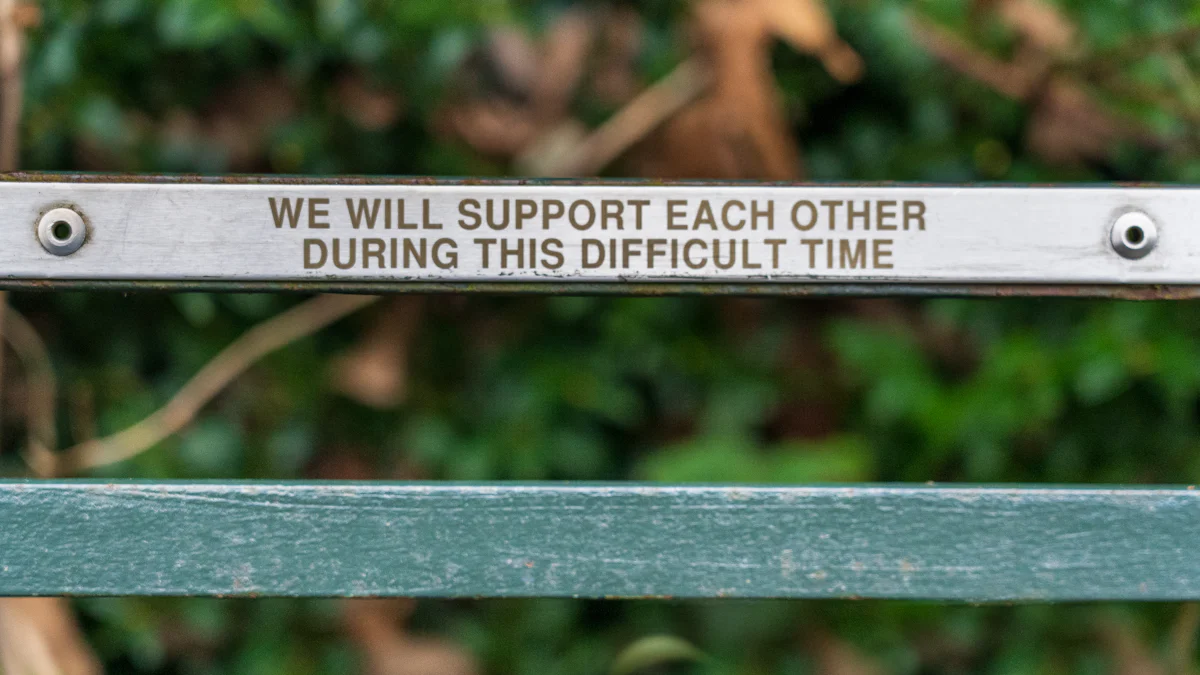How to Help Kids Cope with Disappointment in a Healthy Way

Disappointment plays a big role in a child's life. Every child, from boys to adolescents, faces it. Maggie, a young girl, might feel it when a favorite toy breaks. ABC shows often feature characters dealing with similar emotions. Parents guide children through these moments. Teaching kids to handle disappointment is important. It helps build resilience and emotional intelligence. Maggie's family can use books, articles, and podcasts to find inspiration. Parents can share personal stories. This approach helps kids learn to cope. The goal is to help kids cope with disappointment in a healthy way.
Understanding Disappointment
What is Disappointment?
Disappointment happens when expectations do not match reality. A child might feel disappointment when a toy breaks or when a friend cancels a playdate. These moments can feel overwhelming for a child. Disappointment can lead to feelings of sadness or frustration. Kids often struggle to understand these emotions. Parents need to help kids cope with these feelings.
Janice Morais, an expert in child psychology, suggests that disappointment is like a "Disappointment Muscle." Kids need to exercise this muscle to build resilience. When parents model handling disappointment well, kids learn by example. Parents should share their own experiences with disappointment. This helps kids see that disappointment is a normal part of life.
Why is it Important to Address?
Unresolved disappointment can lead to long-term issues. Kids might develop anxiety or fear of failure. Janice Morais notes that disappointment can affect family relationships. Parents may feel anxious when kids do not meet expectations. This can cause a family breakdown. Parents need to handle disappointment and show support without expressing their own disappointment.
Kids who handle disappointment well can face learning issues with confidence. Parents can use nature play as a tool to teach coping skills. Nature play encourages problem-solving and creativity.
Parents can join a membership community for support and parent tips. These communities offer resources and advice on how to help kids cope. Parents can share experiences and learn from others. Building a network of support can strengthen family bonds. Parents should encourage open communication and validate their child's feelings. This approach helps kids feel understood and supported.
The Role of Parents
Being a Supportive Guide
Parents play a crucial role in helping kids cope with disappointment. You can start by being a supportive guide. Kids need someone who will listen to their feelings. Listening shows that you care about what your child is experiencing. When a child feels disappointed, you should validate those feelings. Saying something like, "I understand you're upset," can make a big difference.
Open communication is another key aspect. Encourage your child to talk about their feelings. Ask questions like, "What made you feel this way?" This approach helps kids express themselves. A child who talks about disappointment learns to process emotions better. Open conversations build trust and understanding.
Setting a Positive Example
Setting a positive example is essential. Kids learn a lot by watching you. Show them how to handle disappointment in a healthy way. If you face a setback, demonstrate calmness and problem-solving. Say, "I didn't get the result I wanted, but I'll try again." This teaches resilience.
Sharing personal experiences can also be powerful. Talk about a time when you felt disappointed. Explain how you coped with it. Kids will see that disappointment is normal. They will learn that everyone faces challenges. This perspective helps kids cope more effectively.
Dr. Lynn Margolies suggests focusing on stabilizing the emotional climate. Keep the stakes low and offer perspective. Sometimes, outside support like coaches or tutors can provide additional guidance. Remember, the goal is to help kids cope with disappointment and build emotional strength.
Strategies to Help Kids Cope

Encouraging Problem-Solving
Kids face disappointment often. Disappointment is hard. Parents can help kids cope by encouraging problem-solving. Teaching decision-making skills is a great start. Kids need to learn how to weigh options. Parents can guide children through small decisions. Choosing a snack or picking a game to play can be simple exercises. These activities build confidence in decision-making.
Allowing children to find solutions is important. Kids should feel empowered to tackle issues. Parents can ask questions like, "What do you think we should do?" This approach fosters independence. Kids learn that they have the power to change outcomes. Problem-solving skills help kids handle challenging situations. Kids gain valuable conflict resolution skills. These skills are essential for navigating friendship dynamics and other social interactions.
Building Resilience
Building resilience is key to helping kids cope with disappointment. Building resilience is key Fostering a growth mindset plays a crucial role. Parents can encourage kids to view challenges as opportunities. Kids should understand that failure is not a disaster. Instead, it is a chance to learn and grow. Parents can share stories of personal setbacks. These stories show that everyone faces challenges.
Celebrating small successes boosts confidence. Parents should give specific praise for efforts. Recognizing achievements, no matter how small, motivates kids. Celebrating losing can also be beneficial. Kids learn that trying is more important than winning. This perspective helps kids handle disappointment better. Resilient kids are better equipped to face life's ups and downs.
Calming children during stressful times is essential. Parents can teach calming techniques like deep breathing. These techniques help kids manage emotions effectively. Calming strategies provide kids with tools to handle disappointment. Kids feel more in control and less overwhelmed.
Parents should plan activities that promote resilience. Outdoor play and team sports offer chances to succeed and fail. These experiences teach kids about perseverance. Kids learn that effort leads to improvement. Parents can follow up with discussions about what worked and what didn't. This reflection helps kids develop a resilient mindset.
Raising resilient kids requires patience and understanding. Parents should remain supportive and encouraging. Kids need to know that it's okay to feel disappointed. Parents should validate these feelings while guiding kids towards solutions. A supportive environment helps kids cope with disappointment in a healthy way.
Using Disappointment as a Developmental Tool

Teaching Emotional Regulation
Techniques for managing emotions
Kids often struggle with big feelings. Disappointment can feel overwhelming. You can teach kids how to manage these emotions. Deep breathing helps calm the mind. Counting to ten gives a moment to pause. Encourage kids to take a break when needed. A quiet space can provide comfort. Kids learn to control their reactions.
Importance of self-awareness
Self-awareness helps kids understand their feelings. Recognizing emotions is the first step. Kids can learn to name what they feel. Words like "sad," "angry," or "frustrated" give clarity. Journaling can help express thoughts. Drawing or writing offers an outlet. Self-awareness builds confidence in handling emotions.
Promoting Empathy and Understanding
Encouraging perspective-taking
Empathy grows through perspective-taking. Kids can learn to see from another's viewpoint. Role-playing helps practice this skill. Ask questions like, "How would you feel?" Encourage kids to consider others' feelings. Books and stories offer examples. Characters face challenges too. Discussing these moments fosters empathy.
Building emotional intelligence
Emotional intelligence involves understanding and managing emotions. Kids with high emotional intelligence handle disappointment better. Encourage open discussions about feelings. Use everyday situations as teaching moments. Praise kids for expressing emotions. Celebrate when kids show empathy. Emotional intelligence leads to stronger relationships. Kids become more compassionate and understanding.
Addressing Common Challenges
Overcoming Parental Anxiety
Managing personal fears and concerns
Parents often feel anxious when kids face disappointment. Dr. Lynn Margolies suggests that parents' reactions can impact relationships. Parents should recognize personal fears. Acknowledge that anxiety stems from wanting the best for kids. Take a moment to breathe and reflect. Ask yourself, "What am I truly worried about?" Understanding these fears helps in managing them.
Parents can benefit from talking with friends or professionals. Sharing experiences provides new perspectives. Remember, every parent faces similar challenges. Building a support network eases anxiety. Focus on being present and supportive for kids. Kids need reassurance more than solutions.
Trusting the process
Trusting the process of growth is essential. Kids learn through experiences, including disappointments. Parents should have faith in kids' abilities to cope. Encourage independence and problem-solving. Remind yourself that growth takes time. Celebrate small victories along the way.
Dr. Margolies emphasizes stabilizing the emotional climate. Keep calm and offer perspective. Kids look to parents for guidance. Show confidence in their resilience. Trusting the process strengthens the parent-child bond. Kids feel empowered and supported.
Dealing with Repeated Disappointments
Strategies for persistent issues
Kids may face repeated disappointments. Persistent issues require thoughtful strategies. Start by identifying patterns. Ask questions like, "What keeps happening?" Understanding the root cause helps in finding solutions.
Encourage kids to brainstorm ideas. Guide them through possible outcomes. Role-playing can prepare kids for real situations. Practice responses to potential disappointments. This builds confidence and readiness.
Parents can introduce new activities or hobbies. New experiences offer fresh perspectives. Kids learn to adapt and find joy in different areas. Encourage exploration and creativity. Variety helps break cycles of disappointment.
Maintaining a positive outlook
Maintaining a positive outlook is crucial. Focus on what kids can learn from each experience. Highlight strengths and achievements. Remind kids of past successes. Positive reinforcement boosts morale.
Encourage kids to express gratitude. Gratitude shifts focus from what's lacking to what's present. Journaling or sharing daily positives can help. Kids develop a habit of looking for the good.
Parents should model positivity. Share stories of overcoming challenges. Show how setbacks led to growth. Kids learn optimism through example. A positive outlook fosters resilience and hope.
Helping kids cope with disappointment builds resilience and emotional intelligence. Parents play a crucial role in this process. Implementing strategies like encouraging problem-solving and fostering empathy can make a significant difference. Recognizing differences between parents and children helps maintain flexible expectations. April is a great time to start these practices. Parents should trust the process and allow kids space to manage emotions. This approach supports successful outcomes and strengthens parent-child bonds. April offers new opportunities for growth and learning. Embrace these moments to guide children toward healthy emotional development.
See Also
Revitalize and Renew: Assisting Your Child Through a Tough Day
Ways to Support Your Child in Managing Anxiety
Strategies for Nurturing Emotionally Well Kids

